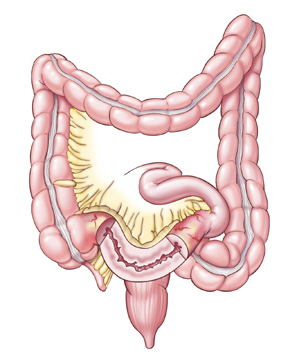Learn all about Crohn’s Disease Symptoms, Causes, Treatment Tests and Diagnosis!
Crohn’s disease, also termed as Crohn’s syndrome is a type of inflammatory bowel disease. Crohn’s disease may occur in any part of gastrointestinal.It causes inflammation of the lining of digestive tract which may lead to wide variety of symptoms like abdominal pain, diarrhea (which may be bloody if inflammation is severe),vomiting, or weight loss, anemia and skin rashes.Inflammation caused by crohn’s disease may spread into deep layers of bowel tissues which is very painful and debilitating condition and sometimes it may lead to life threatening complications.Crohn’s disease is caused by interaction between environmental, infectious, immunolgical and genetic factors.
Symptoms of crohn’s disease
Symptoms of crohn’s disease depends upon the sevrity of condition.However, some commonly reported symptoms of of crohn’s disease are
- Diarrhea
- Abdominal pain
- Cramping
- Blood in stool
- Ulcers
- Reduced appetite
- Weight loss
- Fatigue
- Fever
- Arthritis
Causes of crohn’s disease
The exact cause of Crohn’s disease is still unknown but research has revealed that various factors may contribute in the pathophysiology of Crohn’s disease. These factors include heredity factors, environmental factors, infectious agents and immunological factor.
Immune System
Immune system is strongly correlated with crohn’s disease.It is presumed that any pathogen either it is virus or bacteria may act as trigger to initiate the process of crohn’s disease .Immune system reads this pathogen as foreign particle.Immune system tries to fight off the invading microorganism but due to abnormal immune response immune system to attack the cells in the digestive tract too.
Genetic Factors
People having crohn’s disease in their family have 30times more risk of developing crohn’s disease.Research has revealed that more than thirty genes in human body that play important role in the pathogenesis of crohn’s disease.These genes are involved in various intestinal inflammatory reactions.
Tests and Diagnosis of Crohn’s Disease
In order to confirm the diagnosis of crohn’s disease your doctor may suggest you one or more of the following tests and procedures:
Colonoscopy
Colonoscopy is routine diagnostic procedure recommended by gastroenterologists to help in diagnosis of various intestinal disorders including crohn’s disease.During clonoscopy your doctor view your entire colon using thin and flexible tube with an attached camera.Some people have clusters of inflammatory cells present in the form granulomas which confirms the diagnosis of Crohn’s disease.
Barium enema test
In this test barium containing enema is given to patient.The barium dye coats the lining of the bowel which allows your doctor to evaluate your large intestine with an X-ray.This test is now less common due to availability of CT-Scan and Colonoscopy.
Blood Tests
Blood tests also help in the diagnosis of crohn’s disease.Blood tests includes erythrocyte sedimentation rate (ESR), Platelets count, leukocytes count etc.If patient is anemic and have high number of leukocytes it may indicates that patient is suffering from some kind of inflammatory disorder.
Treatment of crohn’s disease
There is no cure for Crohn’s disease but severity and progress of disease can be reduced by some medications.In crohn’s disease combination of drugs is used like anti-inflammatory drugs, corticosteroids, immunosuppressants and antibiotics.
Anti-inflammatory drugs
Sulfasalazine (Azulfidine)
Mesalamine (Asacol)
Corticosteroids
prednisolone
Hydrocortisone
Immune system suppressors
Azathioprine (Imuran)
Cyclosporine (Neoral)
Antibiotics
Metronidazole (Flagyl)
Ciprofloxacin (Cipro)
 Health & Care Information
Health & Care Information 


